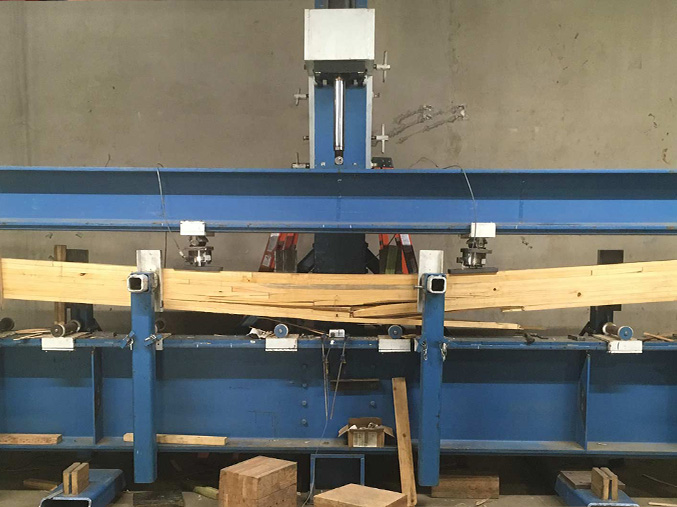ASTM D2011 Impact Testing of Wood Beams
The ASTM D2011 standard specifies a method to determine the resistance of wood beams to impact loading. This test is essential in ensuring structural integrity and durability, especially in applications where timber beams are subjected to dynamic loads such as those found in bridges, buildings, and other infrastructure projects.
ASTM D2011 applies specifically to solid sawn or laminated wood beams with rectangular cross-sections. It is a crucial test for quality managers and compliance officers who need to verify that the wood being used meets specific standards for strength and durability. For R&D engineers, this test provides valuable insights into how different types of wood behave under impact loading conditions.
The ASTM D2011 procedure involves subjecting a wood beam specimen to an impact load using a standard pendulum hammer. The hammer strikes the centerline of the beam from a specified height, and the resulting deflection is measured. This test helps in identifying potential weaknesses or defects within the wood that could lead to failure under actual use conditions.
| Parameter | Description | Value/Range |
|---|---|---|
| Pendulum Hammer Energy | The energy imparted to the beam by the hammer. | 10 ft-lb (13.5 J) |
| Specimen Dimension | Dimensions of the wood beam specimen used in testing. | 2 inches × 4 inches × Length (nominal dimensions) |
| Test Speed | The speed at which the hammer strikes the beam. | 10 ft/s (3.05 m/s) |
| Repeatability | The degree to which repeated tests yield similar results. | ± 2% of the average deflection |
The test aims to evaluate how well wood beams can withstand sudden, high-energy impacts. This is particularly important for ensuring that structures remain safe and functional under varying environmental conditions and potential accidents.
Understanding the results of ASTM D2011 testing allows engineers and architects to make informed decisions regarding material selection and design optimization. By identifying which types of wood perform best in impact tests, they can better predict performance in real-world scenarios.
Why It Matters
The importance of ASTM D2011 testing cannot be overstated, especially for those involved in the design and construction of buildings and infrastructure projects. Proper impact testing ensures that wood beams can safely withstand the dynamic loads they may encounter during use.
- Enhanced Safety: Ensures that structures are safe from potential failures due to sudden impacts.
- Durability: Identifies defects or weaknesses in wood beams before they become problematic.
- Compliance: Meets regulatory requirements for materials used in construction projects.
- Quality Control: Provides a consistent method to assess the quality of wood products.
The test results are critical for ensuring that all components of a structure meet the necessary standards, thereby protecting public safety and minimizing potential risks associated with substandard materials.
Scope and Methodology
- Select appropriate wood beam specimens based on ASTM D2011 requirements.
- Calibrate the impact testing machine to ensure accurate measurements.
- Place the specimen in a fixed position aligned with the pendulum hammer.
- Adjust the height of the pendulum hammer according to specified parameters.
- Release the pendulum hammer, allowing it to strike the centerline of the beam.
- Measure and record the deflection caused by the impact using a precision gauge.
- Repeat the test multiple times to ensure consistent results.
The ASTM D2011 standard ensures that all testing procedures are conducted in a standardized manner, providing reliable data for analysis. This consistency is vital for comparing results across different tests and labs.
Why Choose This Test
- Comprehensive Analysis: Provides detailed insights into the structural integrity of wood beams under impact loading conditions.
- Regulatory Compliance: Ensures that materials meet stringent regulatory and industry standards.
- Accurate Results: Utilizes precise measurement techniques to ensure accurate and reliable data collection.
- Predictive Capability: Allows engineers to predict the performance of wood beams in real-world applications.
- Cost-Effective: Identifies potential issues early, saving costs on later revisions or replacements.





